|
|
|
Sort Order |
|
|
|
Items / Page
|
|
|
|
|
|
|
| Srl | Item |
| 1 |
ID:
134515


|
|
|
|
|
| Summary/Abstract |
What is the relationship between respect for labor rights and foreign direct investment (FDI)? This study explores this connection with an emphasis on the strategic role of governments in attracting FDI. We present a formal model demonstrating that governments can do so by setting the level of labor rights protection and, as a consequence, investors will choose to invest in the face of tough labor regulations or cease investing, anticipating that the costs of abiding by these regulations will be too high. The model also suggests that governments will have an incentive to implement labor regulations when enforcement costs are sufficiently low or the profits from investment are sufficiently high. Using data from developing countries across time, error correction models test the dynamic nature of these hypotheses and find support for them: strict labor laws tend to decrease inflow of FDI, but more FDI tends to encourage better labor practices.
|
|
|
|
|
|
|
|
|
|
|
|
|
|
|
|
| 2 |
ID:
134519
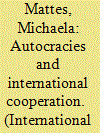

|
|
|
|
|
| Summary/Abstract |
Scholarly work on the impact of domestic politics on international cooperation has grown significantly over time. Unfortunately, there is a democratic bias to much of this literature as scholars typically focus on the relative advantage of democracies at cooperation. Our paper seeks to shed more light on the cooperation potential of autocracies by distinguishing different types of autocratic regimes. We argue that autocracies that more closely resemble democracies in the institutional characteristics that have been found to be important for cooperation (that is, greater leader accountability, limited policy flexibility, and greater transparency) should be more successful at cooperation and thus more likely to cooperate with one another and with democracies. Specifically, we expect single-party and military regimes to be advantaged at international cooperation compared to personalist systems. We test our theoretical expectations using the 10 Million International Dyadic Events data (1990–2004) and find support for our theoretical argument.
|
|
|
|
|
|
|
|
|
|
|
|
|
|
|
|
| 3 |
ID:
134514


|
|
|
|
|
| Summary/Abstract |
This paper argues that banks operating in systems where monetary and regulatory authority are unified in a central bank expect and receive preferential monetary policies, and so act less prudently than do banks in non-unified systems. These incentives arise when the natural tension between counter-cyclical monetary policy and pro-cyclical regulatory policy is resolved in ways that benefit the banking sector. I test the hypothesis using time series cross-sectional regression models that exploit two types of policy interventions—accession to the European monetary union, and several reassignments of domestic regulatory authority—within OECD countries from 1992 to 2009, the period during which the international Basel accords harmonized key aspects of national regulatory standards. The results strongly support the claim that there is a relationship between risk behaviors of banks and the location of regulatory and monetary authority.
|
|
|
|
|
|
|
|
|
|
|
|
|
|
|
|
| 4 |
ID:
134525
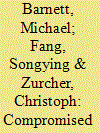

|
|
|
|
|
| Summary/Abstract |
There is considerable evidence that peacebuilding operations are more likely to reproduce important elements of the status quo than they are to propel post-conflict states toward a liberal democracy. In contrast to existing theories that focus on the resources available to peacebuilders or the degree of damage caused by the war to explain the outcome, we highlight the interaction between international and domestic actors. Specifically, we conceive of peacebuilding as a strategic process involving peacebuilders, a postwar government, and other local elites. The equilibrium results show that this process typically concludes in a compromised peacebuilding outcome. This is not surprising when the policy preferences of the actors diverge, but the results also hold when domestic elites prefer a liberal democracy to the status quo. Why? Primarily, because postwar governments are rewarded by relatively impatient peacebuilders with more resources than they would otherwise receive. Additionally, if there exists a secondary elite with veto power, a compromised outcome becomes even more likely. We illustrate these findings with reference to post-1989 peacebuilding operations. Although peacebuilding might not work as it is intended, in the conclusion, we argue that it is better than the alternatives and propose a more realistic measure of peacebuilding success.
|
|
|
|
|
|
|
|
|
|
|
|
|
|
|
|
| 5 |
ID:
134524
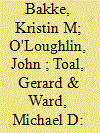

|
|
|
|
|
| Summary/Abstract |
De facto states, functional on the ground but unrecognized by most states, have long been black boxes for systematic empirical research. This study investigates de facto states’ internal legitimacy—people's confidence in the entity itself, the regime, and institutions. While internal legitimacy is important for any state, it is particularly important for de facto states, whose lack of external legitimacy has made internal legitimacy integral to their quest for recognition. We propose that the internal legitimacy of de facto states depends on how convincing they are to their “citizens” as state-builders. Using original data from a 2010 survey in Abkhazia, we examine this argument based on respondent perceptions of security, welfare, and democracy. Our findings suggest that internal legitimacy is shaped by the key Weberian state-building function of monopoly of the legitimate use of force, as well as these entities’ ability to fulfill other aspects of the social contract.
|
|
|
|
|
|
|
|
|
|
|
|
|
|
|
|
| 6 |
ID:
134516
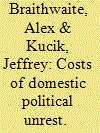

|
|
|
|
|
| Summary/Abstract |
Does domestic political unrest deter foreign direct investment (FDI)? And what are the longer term impacts of unrest upon the market? Most theories suggest that investors are deterred by unrest. However, empirical research returns only marginal support. We argue that these mixed results stem from the conflation of the distinct tactics and outcomes of political unrest. Violent forms of unrest increase uncertainty and risk. By comparison, nonviolent forms of unrest are shown to more frequently achieve their goals and increase the prospects for democratic change and market stability. In addition, investors avoid markets where campaigns have ended in failure, defined as the campaign not achieving their stated political aims. Failed campaigns often precipitate a cycle of unrest that create greater uncertainty over the long-term stability of a state. We find strong evidence in favor of our propositions, even after taking political motivation and non-random selection into account.
|
|
|
|
|
|
|
|
|
|
|
|
|
|
|
|
| 7 |
ID:
134521
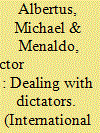

|
|
|
|
|
| Summary/Abstract |
This paper examines how the circumstances of democratic transition affect the consequences of losing office for outgoing dictators. Using data on constitutional origins and democratization from 1875 to 2004, we find that outgoing dictators who are able to impose a holdover constitution during democratization and beyond are less likely to face severe punishment upon relinquishing their rule. These results hold after accounting for alternative explanations of autocrats' post-tenure fate and after using instrumental variables to adjust for potential endogeneity. We also document several mechanisms by which this occurs: proportional representation, the election of right-wing executives, post-transition military influence, and elite control over local politics. The findings suggest that for dictators who fear their ousting in the face of domestic unrest or potential instability, democracy can provide a plausible avenue for protecting their most basic interests.
|
|
|
|
|
|
|
|
|
|
|
|
|
|
|
|
| 8 |
ID:
134522


|
|
|
|
|
| Summary/Abstract |
When does domestic unrest lead to interstate conflict? I present the diversionary target theory that argues that domestically troubled states are more likely to use military force against some, but not all, states because political leaders prefer targets that can evoke their domestic audience's fear or greed in order to enjoy “rally-round-the-flag” effects. I suggest that the fear-producing targets are foreign states that exhibit rapidly rising power or manifest different identities. The greed-producing targets are foreign states occupying disputed territory or exercising regional/local hegemony despite declining power. In addition, I expect that political leaders prefer fear- or greed-producing targets that possess similar powers, because domestic audiences may see initiation of military conflicts against too-powerful states or too-weak states as excessively risky and unnecessary, respectively. From statistical analyses on directed dyad-years from 1920 to 2001, I find that the presence of a rising power, a territory target, or a hegemony target contributes to the correlation between domestic unrest and the initiation of interstate conflict in a statistically significant way.
|
|
|
|
|
|
|
|
|
|
|
|
|
|
|
|
| 9 |
ID:
134517


|
|
|
|
|
| Summary/Abstract |
A large body of work points to diverging civil–military views on the initial decision to use force, yet there is little sense if similar differences hold over appropriate conduct in the midst of armed conflict. The rise of international laws governing behavior during war has similarly raised the question of whether these rules can shape the beliefs of various domestic actors. This paper seeks to address both gaps in the literature by leveraging the use of experiments embedded in a pair of US national surveys to examine the impact of international law and military experience on individual attitudes toward torture. The results show veterans are significantly more likely to support torture compared to civilians without any prior military background. International law further reduces civilian support for torture, while veterans are largely unaffected by general legal appeals. However, when facing highly precise rules, or where the threat of punishment is delegated to third parties, more legalized agreements can significantly reduce veteran support for torture. The results have implications for the study of institutional design, the differential effects of legal norms on nonstate actors, and the potential for greater awareness of the laws of war to influence attitudes toward wartime violence.
|
|
|
|
|
|
|
|
|
|
|
|
|
|
|
|
| 10 |
ID:
134518


|
|
|
|
|
| Summary/Abstract |
In recent years, courts in the Democratic Republic of Congo (DR Congo) have produced some of the most progressive judicial decisions against perpetrators of gender violence of anywhere in the world. Yet, DR Congo is often described as the archetypal collapsed state. This article uses a case study of domestic courts in Eastern DR Congo to analyze how and why complex functions of domestic governance—such as the production of frequent and high-quality judicial decisions by domestic courts—are able to persist, even flourish, in an area where the state is characterized by extreme fragility and weakness. I argue that, rather than a decoupling of law and practice as previous approaches might predict, state fragility in DR Congo has created openings for domestic and transnational actors to exert direct influence over judicial processes at multiple levels of governance. The involvement of external actors in the domestic authority structures of states has resulted in surprisingly progressive human rights outcomes in certain issue areas. However, the article also documents some of the unintended consequences of human rights developments that occur at the very peripheries of broader state-building projects.
|
|
|
|
|
|
|
|
|
|
|
|
|
|
|
|
| 11 |
ID:
134513
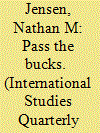

|
|
|
|
|
| Summary/Abstract |
Both countries and subnational governments commonly engage in competition for mobile capital, offering generous incentives to attract investment. Existing economics research has suggested that these tax incentives have a limited ability to affect investment patterns and are often excessively costly when measured against the amount of investment and jobs created. In this paper, we argue instead that the “competition” for capital can be politically beneficial to incumbent politicians. Building off work on electoral pandering, we argue that incentives allow politicians to take credit for firms' investment decisions. We test the empirical implications of this theory using a nationwide Internet survey, which employs a randomized experiment to test how voters evaluate the performance of incumbent US governors. Our findings illustrate a critical political benefit of offering such incentives. Politicians can use these incentives to take credit for investment flowing into their districts and to minimize the political fallout when investors choose to locate elsewhere.
|
|
|
|
|
|
|
|
|
|
|
|
|
|
|
|
| 12 |
ID:
134526
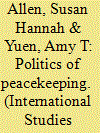

|
|
|
|
|
| Summary/Abstract |
Why are some peacekeeping mandates broad and expansive while others are narrow and well defined? Does variation in mandate flexibility reflect the needs inherent in resolving the conflict or the political interests of powerful states? The modern thread of debate surrounding UN action focuses on whether the political interests of the Permanent Five (P5) members in the Security Council or the stated goals of the institution as a whole drive UN behavior. While most analyses focus on where the UN intervenes to assess the political “pull” that member states exert on the institution, we examine variation in operational latitude across UN peacekeeping in war-torn states. Our analysis offers three main results. Powerful states do constrain international bureaucracies; however, bureaucratic independence varies with the intrinsic interests of the P5. Further, heterogeneity across powerful state preferences systematically affects bureaucratic flexibility in peacekeeping.
|
|
|
|
|
|
|
|
|
|
|
|
|
|
|
|
| 13 |
ID:
134527


|
|
|
|
|
| Summary/Abstract |
The increasing integration of qualitative and quantitative analysis has largely focused on the benefits of in-depth case studies for enhancing our understanding of statistical results. This article goes in the other direction to show how some very straightforward quantitative methods drawn from information theory can strengthen comparative case studies. Using several prominent “structured, focused comparison” studies, we apply the information-theoretic approach to further advance these studies' findings by providing systematic, comparable, and replicable measures of uncertainty and influence for the factors they identified. The proposed analytic tools are simple enough to be used by a wide range of scholars to enhance comparative case study findings and ensure the maximum leverage for discerning between alternative explanations as well as cumulating knowledge from multiple studies. Our approach especially serves qualitative policy-relevant case comparisons in international studies, which have typically avoided more complex or less applicable quantitative tools.
|
|
|
|
|
|
|
|
|
|
|
|
|
|
|
|
| 14 |
ID:
134520
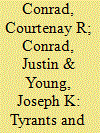

|
|
|
|
|
| Summary/Abstract |
Conventional wisdom suggests that reports of terrorism should be sparse in dictatorships, both because such violence is unlikely to result in policy change and because it is difficult to get reliable information on attacks. Yet, there is variance in the number of terrorist attacks reported in autocracies. Why? We argue that differences in the audience costs produced by dictatorships explain why some nondemocracies experience more terrorism than others. Terrorists are more likely to expect a response in dictatorships that generate high domestic audience costs. Using data from multiple terrorism databases, we find empirical evidence that dictatorships generating higher audience costs—military dictatorships, single-party dictatorships, and dynastic monarchies—experience as much terrorism as democracies, while autocracies generating lower audience costs—personalist dictatorships and non-dynastic monarchies—face fewer attacks than their democratic counterparts
|
|
|
|
|
|
|
|
|
|
|
|
|
|
|
|
| 15 |
ID:
134523


|
|
|
|
|
| Summary/Abstract |
This paper analyzes the development of cooperation between Argentina and Brazil from their initial rapprochement of 1979 to the construction of Mercosur in 1991. It presents an account of cooperation that emphasizes the power and organizational interests of the armed forces and that challenges the prevailing emphases on democratization and neoliberalism. In doing so, it addresses a methodological problem for qualitative research in international relations: What can be done if our theories of why cooperation occurs affect our perceptions of when it begins? Conventional explanations of Argentine–Brazilian cooperation may be biased toward what historian Herbert Butterfield called “Whig history,” which sees in past events associations that exist only in the present. These tendencies can alter our periodization of cases, omit or falsely reject important causal variables, and too readily confirm our preferred hypotheses, but they can also be corrected.
|
|
|
|
|
|
|
|
|
|
|
|
|
|
|
|
|
|
|
|
|